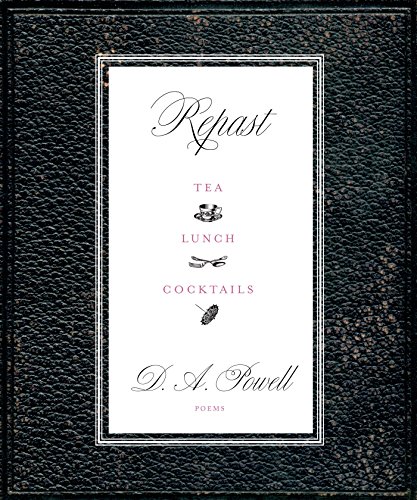Out of a desire for mental nesting or isolation-related nostalgia, I bought three books of poetry by my classmates at Iowa in the mid-90s. After all, I had read through the first inklings of their style. I had watched them work out the kinks in their lines. Then I lost touch. With them. With poetry. With the kinds of thoughts one can have in a poem, reading it or writing it, and nowhere else.
These are the three books I bought from my local bookstore, The Book Table:
Cuntstruck by Kate Northrop
Little Domesday Clock by Sam Witt
Repast: Tea, Lunch, Cocktails by D.A. Powell
First off, Kate has been honest on the page her entire life. I think I can say that confidently. I’ve been reading her poetry for nearly thirty years. I feel Kate’s words deep in my limbic system. I don’t know what the limbic system is exactly. What I mean is, she effortlessly exposes the truth without any whizz-bang or look-at-me. Yeah, I know. “Truth.” “Authenticity.” Whatever. I’m not a poet, but I tried hard enough at it to know that this is difficult. It’s difficult in life and in art. Friends, she has been doing this consistently for decades. I have tried, really tried, to tell a truthful thing in a poem but there will always be a scrim of self-doubt, shame, showiness, something that prevents the bud from blossoming. Kate just does it.

Being truthful isn’t a pre-requisite for a poem, but one does need access to one’s own unfiltered mind to make an honest go of it. I think.
Point is, Kate has that. I mean, I’m not inside her brain but I’ve read the poems. You can read the poems too. They’re right there for you.
Sam throws up more chaff in the face of the truth. Chaff? I mean flak. Flak in the form of the flak we fly through daily, if we are ever online, which is a lot of us, you might call it a new fact of human thinking, the extremely online brain, where Sam is reporting from.
I think.
These new facts of thinking need new poetry and Sam is engaged in wrestling with a form that matches our mental function. Fun to see that Sam is still Sam. Muscular. He has struck me, over the years, as muscular. What I mean is that you’re going to enter a poem like “Little Domesday Clock Stroke the Ninth: Love in the Anthropocene” with the sound of the clicking chain of a roller coaster setting you off on your journey as you leave the roller-coaster-boarding-station. And then Sam will, I hesitate to say “take you on a ride” but it’s something like that. There’s going to be whiplash and loop-de-loops and sudden curves, but you’ll always feel taken care of too. The destination is sure; the thing has been considered.

If I can shift the metaphor: he’s building a modern cathedral. Big. Imposing. Made out of ampersands, twitter handles, hashtags, footnotes… New-new-modernism? Post-futurism? Theorists can debate. What you’ll find here is the world you inhabit reflected with: intelligence, playfulness, an intense, elegiac mix of fear and hope. Exactly what it’s like to be alive right now. Music for the new pandemic.
These poems exist and are available to you, should you require them.
He wouldn’t remember but I often sat next to D.A. Powell during one workshop semester. (Maybe 1994?) I can’t actually remember the instructor, but I remember Doug! Can I call him Doug? Do people call him Doug? Did we? I mean, I didn’t know I was sitting next to D.A. Powell at the time. Honestly, I didn’t get the long lines. I was intimidated by those lines. He was creating whole playgrounds while I was pushing sand around in the sandbox. It takes a level of maturity and confidence to make the page conform to your lines. To say. no go ahead and cut the actual paper in a special way for me. This is how my poems go.
I mean, it’s like sitting next to W. Whitman and being like, “This is OK but it’s a bit wordy, Walt. Tighten it up.”
Eventually, you catch up with Walt and then you get to live in his world.

This book, Repast: Tea, Lunch, Cocktails, is a big book. A compendium. And it’s not all Long Lines but, I mean, I get the heartbreak now. I get the beating heart of those lines in the line breaks. I didn’t before. Not consciously, anyway. But those long lines stuck with me. Troubled me. I kept returning to Powell’s work to see where they were headed. Better to say, to see why they were headed.
Maybe it’s the season or maybe it’s the time of man, the late Anthropocene, but jesus christ Powell’s poems make me emotional. I just randomly paged to [the sad part of living is eating and dying] and wanna cry, but not in a bad way. In a Frank O’Hara kinda way. And like, that’s a Short(er) Line poem but the Long Line poems that come before serve to heighten the impact. He teaches us how to read the poems with the poems. We get it, and as soon as we think we get it, then he shifts it up. It’s a marriage of form and emotion that really knocks you out. Emotion is the key word, I think. Love is also a key word.
These poems are ready for you in the world, should you need them.

